INTERNACIONAL
Capitol Police arrest protesters disrupting budget markup as Cory Booker thanks them for defending Medicaid

More than two dozen protesters were arrested for disrupting the House Energy and Commerce’s budget reconciliation markup on Tuesday, as Sen. Cory Booker, D-N.J., thanked those holding court in the hallway.
«Around 2 p.m., 26 people were arrested for illegally demonstrating in the Rayburn House Office Building. They were arrested for 22-1307 Crowding, Obstructing, and Incommoding. It is against the law to protest inside the Congressional Buildings,» the U.S. Capitol Police Department told Fox News Digital.
Dozens of protesters, many in wheelchairs, filled the halls outside the John D. Dingell Room in the Rayburn House Office Building on Tuesday afternoon, chanting, «No cuts to Medicaid!» Several protesters, who were blocking the entrance to the committee room, were wheeled away and arrested by Capitol police after multiple warnings.
A defiant Booker walked by the budget markup during its first hour and was greeted by the cheers and whistles of those protesting Medicaid cuts. Booker, who spent more than 12 hours protesting President Donald Trump’s agenda on the steps of the U.S. Capitol just two weeks ago, thanked the protesters for showing up to protect Medicaid.
HOUSE GOP UNVEILS MEDICAID WORK REQUIREMENTS IN TRUMP’S ‘BIG, BEAUTIFUL BILL’
Demonstrators calling for preservation of Medicaid funding, are removed from the House Energy and Commerce markup of the FY2025 budget resolution in Rayburn building on Tuesday, May 13, 2025. (Tom Williams/CQ-Roll Call, Inc via Getty Images)
A Capitol police officer confirmed to Fox News Digital that disruptors were arrested for protesting and would be processed and released immediately. Many protesters remained in the hallway during the first few hours of the markup as others were removed for shouting during the representative’s testimonies and subsequently arrested.
ANTI-ABORTION PROVIDER MEASURE IN TRUMP’S ‘BIG, BEAUTIFUL BILL’ COULD SPARK HOUSE GOP REBELLION
«The audience is supportive that you’re all here and participating. We want you here. You’re part of the process. We want you to be here, but we have to proceed. And the rules of the House, and the law is that – if you’re disruptive, you’ll be removed, and you’re subject to arrest. I don’t make that decision, the Capitol Police does,» Kentucky Republican Rep. Brett Guthrie, Chairman of the Energy and Commerce Committee, said following one of several disruptions by protesters.
Inside the budget markup, Democrats and Republicans sparred over rhetoric about Medicaid cuts. Democrats claimed the Republican budget bill would cut vital access to Medicaid, with many representatives sharing stories of their constituents who have benefited from its services. Meanwhile, Republicans accused Democrats of lying to the American people about Medicaid cuts – a word Guthrie deterred his colleagues from using.
«I want to send one very clear message: you’re being lied to. The other side is telling you a lot of things about this legislation. I’m not sure they have read this legislation,» Rep. Richard Hudson, R-N.C., who chairs the Republican Congressional Campaign Committee, said.
Republicans mostly avoided the deep cuts to Medicaid pushed by fiscal conservatives in the House Republican Conference, which could serve to benefit moderate Republicans who have fielded relentless attacks from Democrats over potential Medicaid cuts. House Republicans, however, have vowed to eliminate waste, fraud and abuse in the Medicaid program.

Protesters staked out the House Energy and Commerce’s budget reconciliation markup on Tuesday. (Fox News Digital)
The committee’s budget markup includes increased regulations and program cuts to Medicaid, including tightened address verification requirements, ensuring deceased individuals are not enrolled, more provider screening requirements, removing excess Medicaid payments, revising home equity limits for determining eligibility, prohibiting illegal immigrants from obtaining Medicaid services, ensuring accurate payments, prohibiting funding for gender transition procedures for minors and requirements for states to establish Medicaid community engagement programs.
«This budget does not cut Medicaid, Medicare or Social Security benefits for the Americans who truly need them. We are strengthening and protecting Medicaid for pregnant women, children, individuals with disabilities, low-income seniors and vulnerable families. These Americans will continue to have access to the care they need and deserve. What we are doing is eliminating waste, fraud and abuse,» Rep. Erin Houchin, R-Indiana, told the committee.
But despite Republicans’ assurances that the proposed budget does not cut Medicaid, Democrats testified, one after the other, about the threats program cuts pose to Americans.
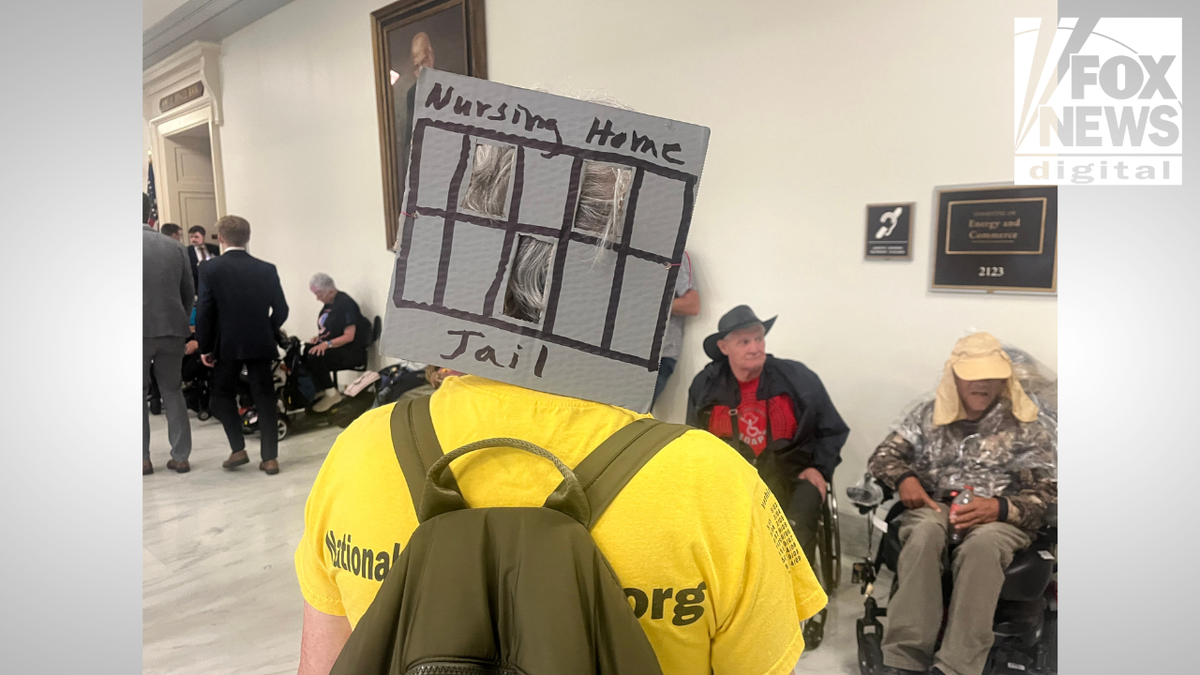
Protesters disrupted the House Energy and Commerce’s budget reconciliation markup on Tuesday. (Fox News Digital) (Fox News Digital)
«They are cutting this Medicaid care and these Medicaid dollars to pay for tax cuts for Elon Musk and billionaires, so this money isn’t even going towards funding better care for people who are eligible… We are cutting money and health care from people and families who are suffering, to pay for tax cuts for the rich. It is a crime happening in front of the American public right now,» Rep. Alexandria Ocasio-Cortez, D-N.Y., said.
The proposed legislation would put a new 80-hour-per-month work requirement on certain able-bodied adults receiving Medicaid, aged 19 through 64.
It would also put guardrails on states spending funds on their expanded Medicaid populations. The Affordable Care Act (ACA) allowed states to expand Medicaid coverage to adults who make up to 138% of the poverty level.
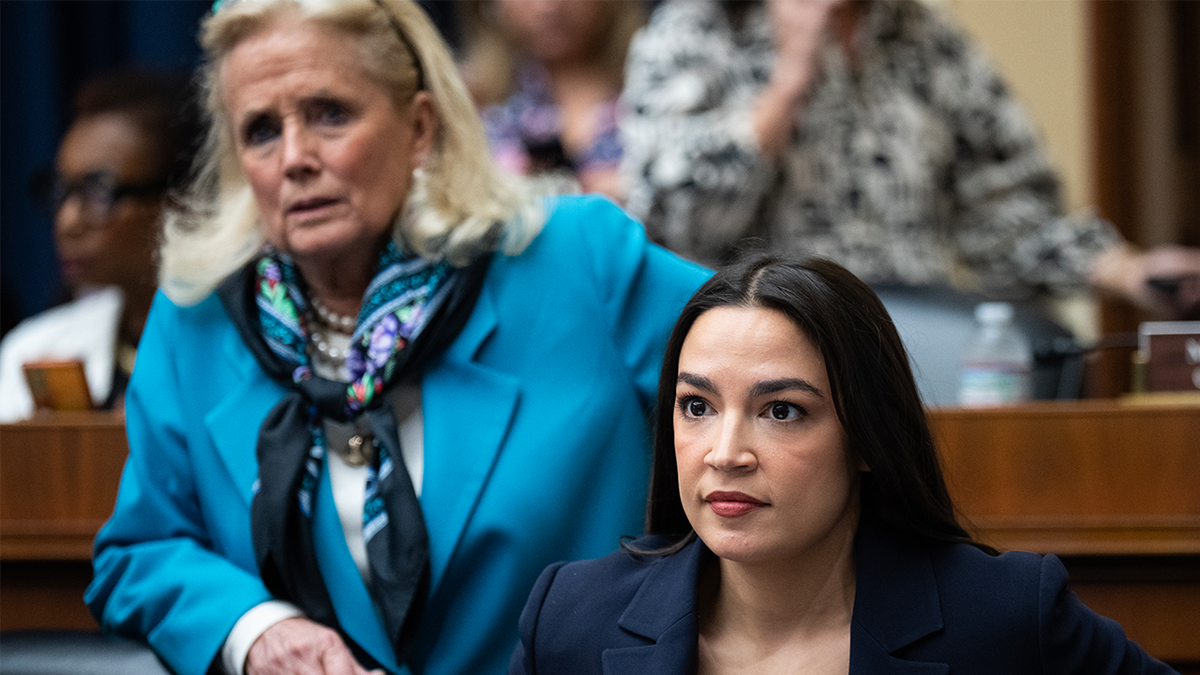
Reps. Alexandria Ocasio-Cortez, D-N.Y., right, and Debbie Dingell, D-Mich., attend the House Energy and Commerce markup of the FY2025 budget resolution in Rayburn building on Tuesday, May 13, 2025. (Tom Williams/CQ-Roll Call, Inc via Getty Images) (Tom Williams/CQ-Roll Call, Inc via Getty Images)
More specifically, states that provide Medicaid coverage to illegal immigrants could see their federal Medicaid reimbursement dollars diminished, putting more of that cost on the state itself.
The bill would also require states with expanded Medicaid populations to perform eligibility checks every six months to ensure the system is not being abused.
CLICK HERE TO GET THE FOX NEWS APP
The Energy & Commerce Committee, which has broad jurisdiction, including over federal health programs, telecommunications and energy, was tasked with finding at least $880 billion in spending cuts to pay for other priorities in Trump’s «big, beautiful bill.»
Guthrie told House Republicans on a lawmaker-only call on Sunday night that the panel had found «north of $900 billion» in savings.
House Of Representatives,Capitol Protests,Elections,Cory Booker,US protests
INTERNACIONAL
Trump gives Hamas ‘three to four days’ to accept plan or meet a ‘a very sad end’
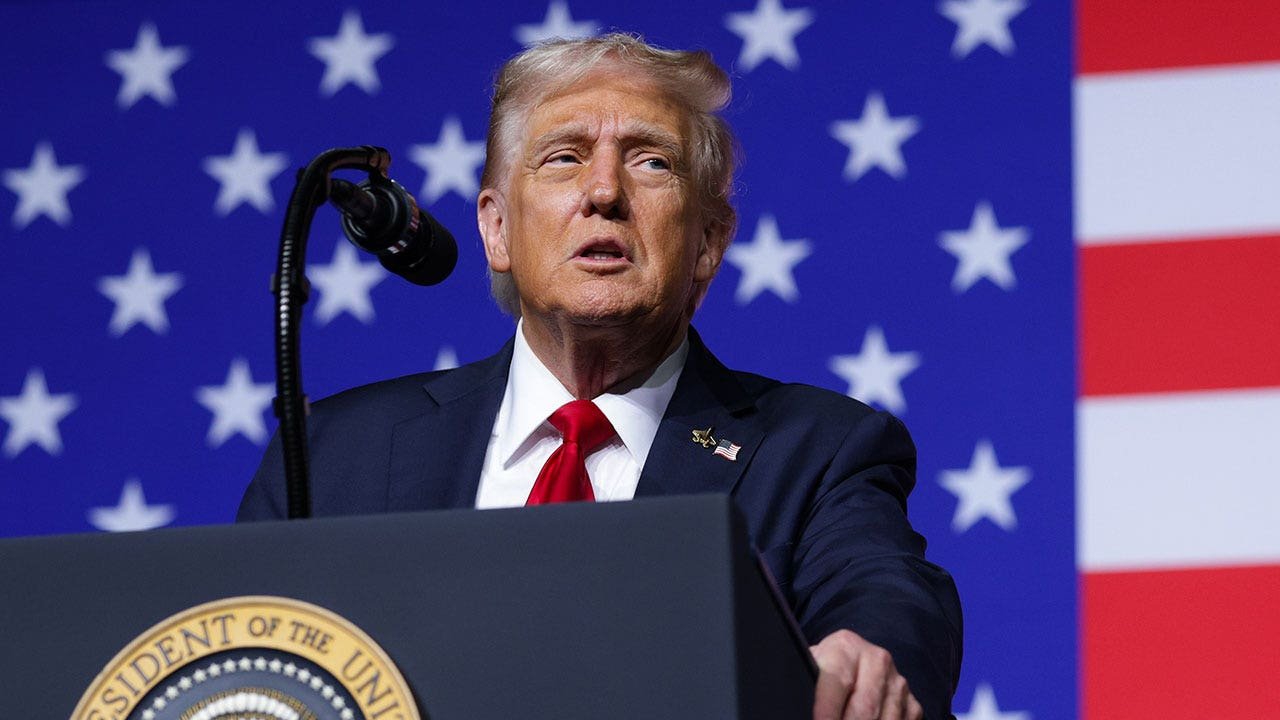
NEWYou can now listen to Fox News articles!
President Donald Trump on Tuesday said the Hamas terrorist network has up to four days to accept his 20-point peace plan to end the war in the Gaza Strip or face «a very sad end.»
«We’re going to do about 3 or 4 days. We’ll see how it is,» he told reporters. «Now, all of the Arab countries are signed up. The Muslim countries all signed up. Israel’s all signed up.
«And Hamas is either going to be doing it or not. And if it’s not, it’s going to be a very sad end,» he added.
TRUMP UNVEILS 20-POINT PLAN TO SECURE PEACE IN GAZA, INCLUDING GRANTING SOME HAMAS MEMBERS ‘AMNESTY’
Hamas fighters stand in formation as Palestinians gather to watch the handover of three Israeli hostages to a Red Cross team in Deir el-Balah, central Gaza, on Feb. 8, 2025. (Majdi Fathi/NurPhoto via Getty Images)
Israeli Prime Minister Benjamin Netanyahu on Monday accepted a plan that would ultimately end military operations in Gaza, disarm Hamas, secure the return of all 46 hostages and lay out a path to rebuild the war-ravaged Gaza Strip.
Fox News confirmed on Monday that top officials from Qatar and Egypt met with Hamas negotiators and shared the U.S.-backed plan.
The Hamas negotiators confirmed they would review it «in good faith and provide a response,» an official briefed on the talks said.
The plan has been widely championed by leaders across the Middle East, Europe and parts of Asia.
A joint statement issued by Saudi Arabia, Jordan, the United Arab Emirates, Indonesia, Pakistan, Turkey, Qatar and Egypt not only «welcomed» Trump’s proposal to end the war and rebuild Gaza, but also highlighted his commitment to addressing Israel’s security concerns, including barring the forced displacement of Palestinians and halting annexation of the West Bank.
NETANYAHU APOLOGIZED FOR AIRSTRIKES DURING ‘HEART-TO-HEART’ WITH QATARI LEADER, TRUMP SAYS
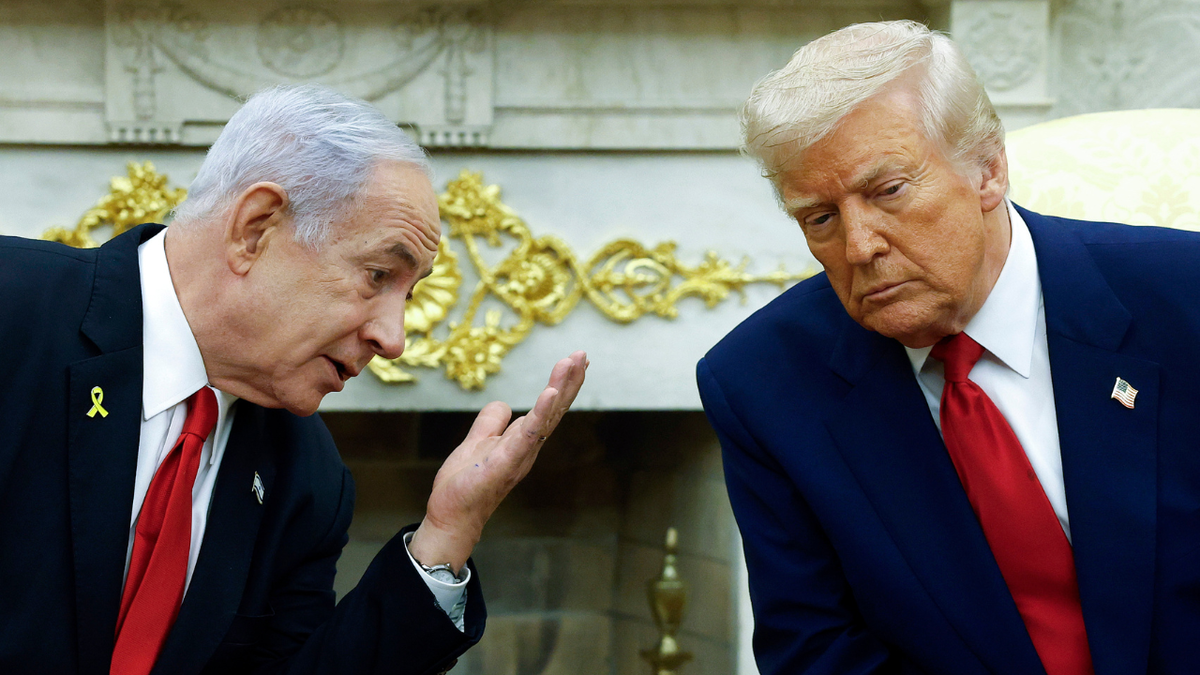
Israeli Prime Minister Benjamin talks to U.S. President Donald Trump during a meeting in the Oval Office of the White House on April 7, 2025, in Washington, D.C. (Kevin Dietsch/Getty Images)
«The ministers affirm their readiness to engage positively and constructively with the United States and the parties toward finalizing the agreement and ensuring its implementation, in a manner that ensures peace, security, and stability for the peoples of the region,» the joint statement said.
Similarly, British Prime Minister Keir Starmer and French President Emmanuel Macron — both of whom have said they now recognize the «State of Palestine» despite Washington’s opposition to the move — championed Trump’s peace plan in separate statements.
The 20-point proposal was met with mixed reviews in Israel, where hard-right officials within Netanyahu’s own coalition fiercely rejected the prime minister’s acceptance of the plan.
Netanyahu’s finance minister, Bezalel Smotrich, renewed questions over the fate of the prime minister’s coalition after he condemned the agreement on Tuesday as a «resounding diplomatic failure» and said it amounted to «a closing of eyes and turning our backs on all the lessons of Oct. 7.»

Palestinians run for cover during an Israeli airstrike on a high-rise building in Gaza City, Friday, Sept. 5, 2025, after the Israeli army issued a prior warning. (Yousef Al Zanoun/AP Photo)
CLICK HERE TO GET THE FOX NEWS APP
In contrast, fierce critics of Netanyahu, including Opposition leader Yair Lapid, said he is «convinced that amidst the tangle of interests and the pressing timeline dictated by the hostages’ situation, what President Trump presented yesterday is the only plan with feasibility.»
Blue and White Party leader, Benny Gantz, also confirmed that his party «would not allow petty politics to sabotage the plan.»
Fox News’ Trey Yingst contributed to this report.
donald trump,israel,middle east,benjamin netanyahu,world
INTERNACIONAL
Ángel Víctor Torres, ministro de Memoria Democrática: “No se cierra la puerta a que la ley pueda ser modificada y se amplíe el plazo para nuevas solicitudes de ciudadanía española”
INTERNACIONAL
GOP accuses Dems of risking shutdown to restore ‘illegal immigrant healthcare’

NEWYou can now listen to Fox News articles!
As Congress barrels toward Tuesday’s midnight deadline to avoid a government shutdown, Republicans are blasting Democrats for prioritizing «free healthcare for illegal aliens» over paying U.S. troops, who would miss paychecks if the government closes.
Both Vice President JD Vance and House Speaker Rep. Mike Johnson, R-La., have accused Senate Minority Leader Sen. Chuck Schumer, D-N.Y., of trying to reinstate taxpayer-funded medical benefits for illegal immigrants through congressional Democrats’ continuing resolution (CR), a charge Democrats dispute.
Congressional Democrats’ main demand has been an extension of expiring Obamacare tax credits, but among their wishlist is a push to repeal the healthcare title of President Donald Trump’s signature piece of legislation.
Republicans aimed to eliminate waste, fraud and abuse from Medicaid, reforms which included limiting eligibility and penalizing states who extended healthcare benefits to illegal immigrants.
HOUSE DEMOCRATS THREATEN SHUTDOWN FIGHT TO PROTECT OBAMACARE PERKS
House Speaker Mike Johnson, right, accused Senate Minority Leader Chuck Schumer, left, of prioritizing «free healthcare for illegal aliens» over paying U.S. troops. (Kent Nishimura/Bloomberg via Getty Images; Tasos Katopodis/Getty Images)
«They want to have illegal aliens come into our country and get massive healthcare at the cost to everybody else, and we don’t have it. And that’s, I would say, the number one reason that they want to strike is to get illegal immigrants’ healthcare,» Trump told reporters in the Oval Office on Tuesday, as he said Republicans are not responsible for the looming government shutdown.
«Democrats are about to shut down the government because they demand we fund healthcare for illegal aliens,» Vice President JD Vance posted on X last week. Johnson added on Sunday that Schumer wants to «reinstate free healthcare for illegal aliens paid by American taxpayers.»
JD VANCE SAYS GOVERNMENT LIKELY ‘HEADED INTO A SHUTDOWN’ AFTER TRUMP MEETS WITH DEMS
Schumer and congressional Democrats, however, have labeled the issue the «Republican healthcare crisis,» and placed the onus of a government shutdown on Trump and the GOP. The top Senate Democrat rejected Republican’s claims that they were trying to allow illegal immigrants onto federal health care rolls ahead of the vote to fund the government.
«They say that undocumented people are going to get these credits,» Schumer said. «That is absolutely false. That is one of the big lies that they tell.»
Republicans have seized on Democrats’ efforts to roll back Medicaid reform included in Trump’s One Big Beautiful Bill Act (OBBBA), which narrowly passed through Congress earlier this year.
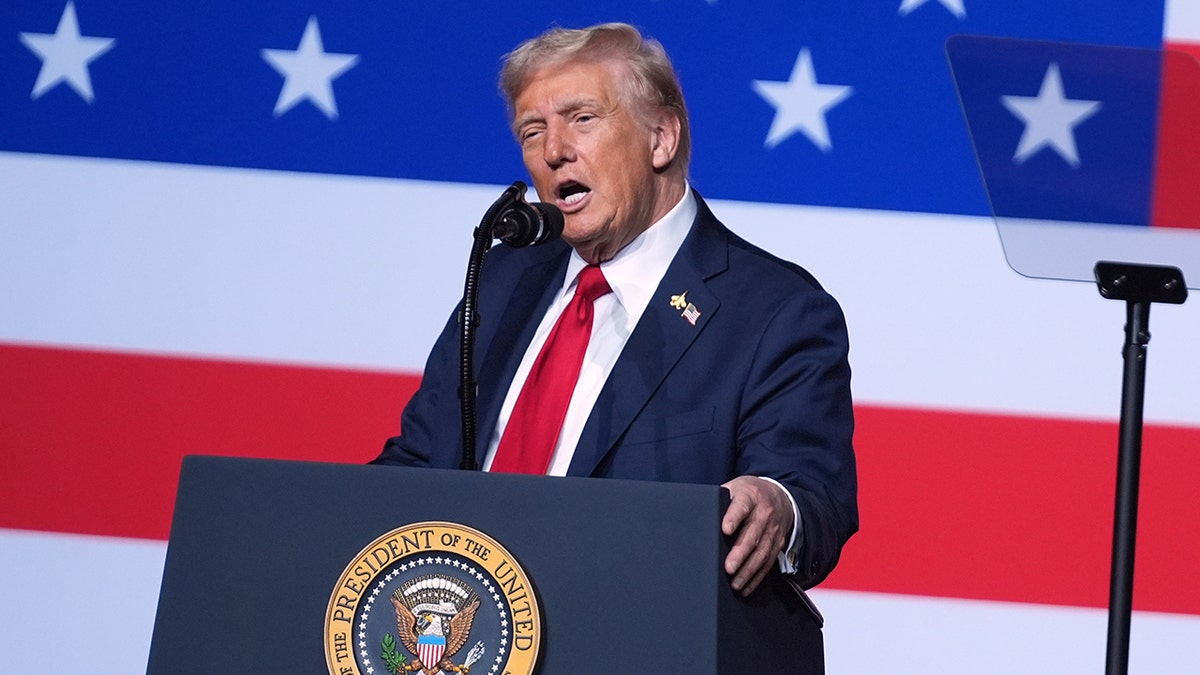
President Donald Trump speaks to a gathering of top U.S. military commanders at Marine Corps Base Quantico, Tuesday, Sept. 30, 2025, in Quantico, Virginia. (AP Photo/Evan Vucci)
Last week on Truth Social, Trump stated, «Democrats want Illegal Aliens, many of them VIOLENT CRIMINALS, to receive FREE Healthcare.»
While many of the provisions they sought to include in Trump’s colossal bill were nixed by Senate rules, one provision included in the legislation limited Medicaid eligibility to U.S. citizens and other certain lawful permanent residents, according to the American Medical Association.
That provision simultaneously barred «previously eligible legal immigrants such as refugees, individuals granted asylum, and certain abused spouses and children,» and is set to take effect on Wednesday, Oct. 1.
Taxpayer-funded Medicaid coverage for illegal immigrants has long been prohibited, except for treatment of emergency medical conditions.
The OBBBA made certain changes to the federal medical assistance percentage (FMAP), which dictates how much the federal government matches states’ funding for Medicaid.

As lawmakers debate a government funding extension, Speaker of the House Mike Johnson, R-La., awaits a meeting at the U.S. Capitol in Washington, D.C., on Wednesday, Sept. 17, 2025. (AP Photo/J. Scott Applewhite)
Obamacare, meanwhile, allowed for states to expand their Medicaid populations with the federal government matching 90% of the costs of that expanded population. States that took that expansion and also provide healthcare funding for illegal immigrants are due to receive less federal funding under OBBBA, with that cost-sharing margin going from 90% to 80%.
And while illegal immigrants do not qualify for Medicaid and Medicare, Emergency Medicaid reimbursements allow hospitals to recoup the cost of emergency care for people who would be eligible for Medicaid if they had legal status. The OBBBA limits those federal dollars, however, to just allow for the state’s regular FMAP share.
CLICK HERE TO GET THE FOX NEWS APP
While ACA subsidies aren’t set to expire until the end of this year, Democrats warned that insurers were set to send out new guidance and rates on Wednesday. They charged that on average, premium costs for people enrolled on Obamacare that use the credits would go up by an average of 114%.
donald trump,health care healthy living,illegal immigrants,immigration,house of representatives politics,senate

 POLITICA3 días ago
POLITICA3 días agoFrancos apuntó al gobierno de Kicillof por el triple femicidio narco: “¿Qué dirá la gente que votó a Magario?»

 POLITICA2 días ago
POLITICA2 días agoEmilia Orozco: “Si vuelve el kirchnerismo, todo el esfuerzo que hicieron los argentinos se va a tirar a la basura”

 POLITICA3 días ago
POLITICA3 días agoCiudad vs. provincia. Los recelos y los negocios que reveló el triple crimen de Florencio Varela






























